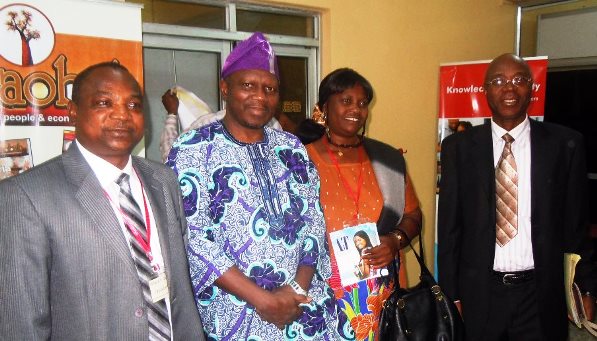Experts make case for eLearning at Lagos Forum
By MARTIN EKPEKE and MOSHOOD ABUBAKAR
Nigeria’s human high-skill capacity index could be rapidly improved upon through eLearning, said experts at a two day eLearning forum in Lagos at the weekend. In addition, the experts concluded that the shrinking admission opportunities for the yearly rising number of university candidates could be effectively addressed by eLearning. With a population of over 160 million, Nigeria has less than 500 institution of higher learning. On the average, only 18 out of 100 people looking for admission into higher institution get admitted every year, making it one of the most difficult places to seek higher education.
But e-Learning has emerged as an attractive alternative for the content delivery of education, training and development because of its numerous advantage. The advent of internet and multimedia has injected a paradigm shift in education, training and development thereby resulting in easier, flexible, attractive, meaningful and effective content dissemination and assimilation without the constraint of time and location.
It is therefore imperative on government to have a clear-cut policy action-plans and to encourage massive investment in ICT for online education said the experts as part of their recommendations at the two days West Africa E-learning Conference and Exhibition organized by Baobab Media in association with Accra Institute of Technology (AIT) with the collaboration of the University of Lagosand the support of the Economic Community of West Africa States (ECOWAS).
Though Africa still lag behind as a result of lack of knowledge and awareness on the subject matter, studies have shown that e-learning delivers quality education to student who involved in it because of the ease of convenience it affords said the former Vice-Chancellor of the University of Lagos, Prof. IbidapoObe adding that “e-learning is a concept of unlocking knowledge of teachers, according to him, since IT is already transforming the world, there is no barrier to acquiring knowledge.”
Also, according toHonorable DayoOgunniyi, Executive Chairman at Spectrum Books limited, “e-learning is going to bail us out from the problem of degraded educational system.” He described the conventional education system as not capable of taking care of the huge amount of people wanting to be educated. Demand for education has consistently increased in the last few years, but the physical infrastructures are not enough to cater for the demand.
For Chris Uwaje, the President of the Institute of Software practitioner of Nigeria (ISPON) there is need for local knowledge advocacy, “e-lesson is very important but there is no standard. There should be standards to create lesson because IT can enhance knowledge” he also advised that since 72% of Nigerians live in rural and semi-rural areas, the gospel of e-learning must be preached to them.
Also in his presentation titled ‘ICT as a 21st century standard for Nigerian teachers,’ Dr. Steve Nwokeocha, Director of Professional Operations at the Teachers Registration Council of Nigeria, (TRCN), an agency under the Federal Ministry of Education believes that since the 21st century is best known for scientific knowledge, ICT and globalization, those who impact knowledge must consider the pivotal role of ICT because people are now in the information society.
Even though Nwokeocha’s paper analyses the above characteristics of the 21st century that make it imperative for Nigerian teachers to appreciate and use information and communications technology tools to broaden their horizon, he is more concerned about standard of the Nigerian teachers. To him, standard is a generally accepted point of reference and standards in the context of ICT in the 21st century that places a country in advantageous position in the comity of nations.
His words “Within the teaching profession, the Africa continent and entire world should forge a common fronts to see that the regulation of the teaching profession has common yardsticks so that teacher’s qualifications, knowledge, competencies, values, rights and obligations are comparable across the countries.” Dr. Nwokeochamade a case for teachers to have the spirit of “teachers without borders”. The aim is to make teachers global professionals, marketable worldwide, and globally competitive. It is also to ensure that the quality of teaching and learning in one country favorably compares with the quality of teaching and learning in another. “No e-learning without e-teaching” he stressed.
With the evolution of IT, learning and teaching cannot credibly take place without those involved being leaders in the handling of ICT tools. The modern world is an information society, driven by a complex set of digital device and telecommunication networks as an all-encompassing platform. The educational system needs to operate in accordance with this global standard which makes ICT as an indispensable tool for the 21st century teaching and learning in Nigeria.
ICT is one of the major contemporary factors shaping the global economy and producing rapid changes in society. It has fundamentally changed the way people learn, communicate and do business. It is also transforming the nature of education; it accelerates and deepens students’ basic skills in any schools subject especially reading, mathematics and the sciences, it challenges students to learn, be independent and hence be responsible and helps update student’s academic knowledge and instructional practices.
Today’s educational world depends on ICT; there are opportunities for close co-operation with colleagues in the same or even other fields though networking and internet services; educators are challenged to new methods of acquiring knowledge through knowledge sharing and are ultimately connected to the world. The advent of internet and multimedia has injected a paradigm shift in education thereby resulting in easier, flexible, attractive, meaningful and effective content dissemination and assimilation without the constraint of time and location.
According to the Director General of the Administrative Staff College of Nigeria (ASCON), Mr. A.A. Peters’ paper titled ‘capacity building in e-learning for the Nigerian public sector’ delivered by Mr. BalaSambo, an Administrative Director at the college, he described e-learning as an approach to facilitate and enhance learning by means of personal computers, CD-ROMS and the Internet.
He listed the benefits of e-learning to include self-paced which gives individuals a chance to speed up or slow down as necessary, self-directed allowing individuals to choose content and tools proper to their differing interests, needs and skill levels; accommodates multiple learning styles using a variety of delivery methods that are more effective to certain individuals.
e-Learning is envisaged to contribute to the improvement of educational skills, including time and project management. This according to the Chairman of Baobab Media, Dr. Sola Afolabi has the capacity to improve the flow of information at all levels of the Nigerian education system. When queried on what the outcome of the two days event will be, he said the recommendations of the conference will be presented to the Ministry of Education so that proper policies will be in place to ensure e-learning appreciation and utilization in the country’s educational process. He also assured the over 300 participants at the two days conference and expo that the facilitators of the conference will ensure that the outcome of the forum will be made readily available to managers of the country’s educational system whether within government or the private sector.





























